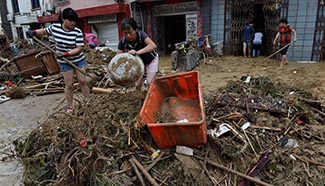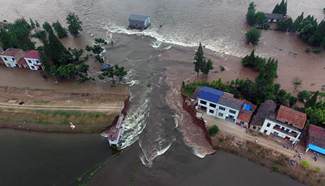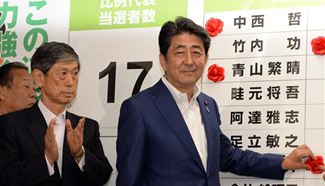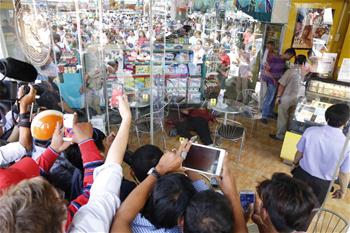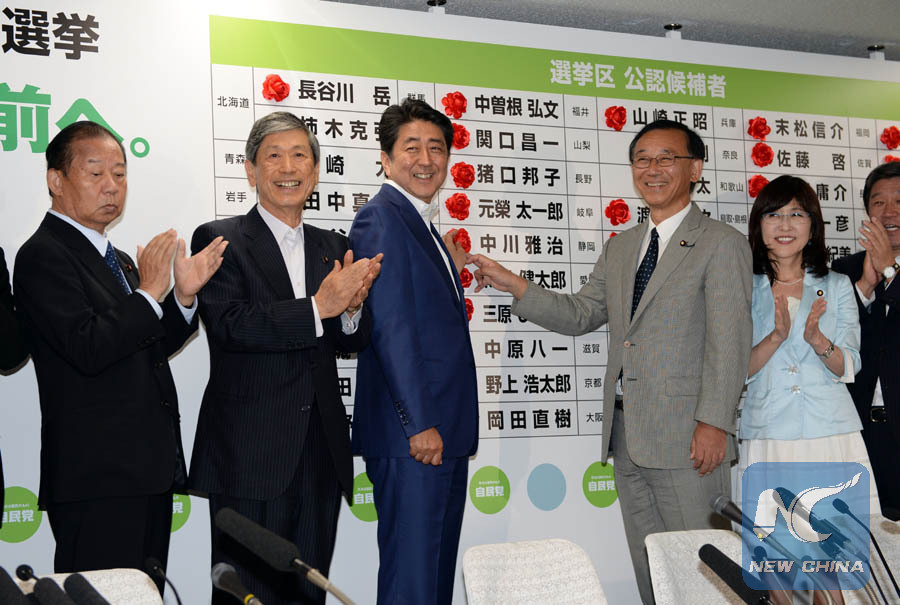
President of the ruling Liberal Democratic Party Shinzo Abe (3rd L) sticks the sign of victory on a board at LDP headquarters, Tokyo, Japan, July 10, 2016. (Xinhua/Ma Ping)
by Yan Lei, Liu Tian
TOKYO, July 11 (Xinhua) -- The Japanese ruling camp led by Prime Minister Shinzo Abe has won a majority in Sunday's upper house election, which means Abe's coalition and like-minded parties managed to take the two-thirds majority needed to try to revise the nation's post-war pacifist Constitution.
The victory, though came as no surprise to the public, could pose a danger to Japan and regional stability, as it means Prime Minister Shinzo Abe will snatch more power and put Japan's Constitution in jeopardy.
The ruling coalition's "victory" in Sunday's election is considered more as a result of a lack of better choices and the electorate resorting to maintaining the status quo, rather than any actual comment on the advantage of Abe's policies.
Abe's Liberal Democratic Party (LDP) fell short of winning a simple majority.
For one thing, Abe has been touting the so-called "achievements" of his economic policies dubbed "Abenomics", referring only to favorable economic data, while being evasive about his true political agenda which is to revise the pacifist Constitution, a strategy that successfully disarmed many voters who are against constitutional revision.
For another, the voters, though discontent with Abe's policies, felt a lack of better choices, as they are equally dissatisfied with the opposition parties, which seemed to have also failed to offer feasible solutions to the problems that Japan is faced with. Many people, therefore, chose to vote to keep the status quo, or even refused to vote.
The ruling bloc's victory falls in line with a number of recent polls conducted by local media before the election. But as Abe sweeps away obstacles to his political ambition, including his long-cherished goal of changing the pacifist Constitution, what may now be facing Japan is cause for alarm.
In the past three years, Abe has been firmly pushing forward his political agenda and gradually overturning seventy years of pacifism in Japan, despite any opposition inside or outside his party, or massive protests from the general public.
One typical example is that Abe, on the back of the ruling LDP and its coalition partner Komeito Party's combined majority in parliament, pushed through and enacted controversial security laws, which enabled Japan's Self-Defense Forces to fight wars overseas for the first time since the end of World War II and made it possible for Japan to intervene militarily in regional conflicts.
Under Abe's administration, Japan's military spending has been consistently on the rise each year, with the latest military budget for fiscal 2016 1.5 percent higher than the previous year, amounting to 5.05 trillion yen (50.21 billion U.S. dollars) and marking a record high.
As Japan's foreign policies go, Abe's administration, trying to cement its alliance with the U.S. and meddling in issues that Japan is not a concerned part with, such as the South China Sea issues, serves to only hype up tensions and damages regional stability, which adds to trouble rather than pushing for peace.
Now, with Abe's ruling bloc grabbing more power in parliament, although he avoided talking about it on his campaign trail, his political goal of revising the Constitution is coming closer and closer to fruition, while an uninformed public continue to wait in vain for his latest Abenomics economic miracle.
With Japan's pacifist Constitution at serious stake and Abe's power expanding, it is alarming both for Japan's Asian neighbors, as well as for Japan itself, as Japan's militarization will serve to benefit neither side.
For Japan, it is worth noting that Japan owes its rapid development and economic prosperity in the past decades before the lost years, partly to its promise of peace after its defeat in World War II. Any deviation from the peaceful path may cost the country heavily in economic terms, as well as its relationship with neighboring countries.
And as Japan becomes more involved in overseas military conflicts, it will also make Japan less secure, instead of safer as Abe's ruling party advocates, for the Japanese might suffer the risk of becoming target of terrorist attacks.
As for Japan's Asian neighbors, due to historical reasons, they have been paying close attention to Japan's security policies and moves. Now, Japan's re-militarization as well as Abe gaining more power, will become new causes for alarm for them.





